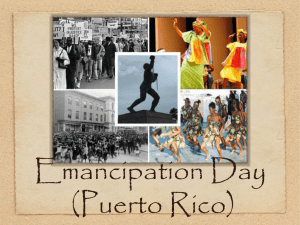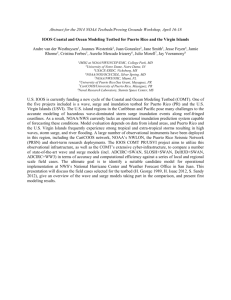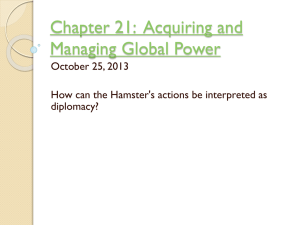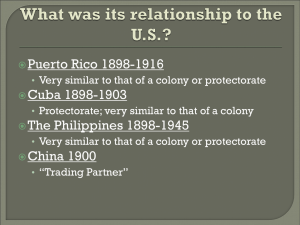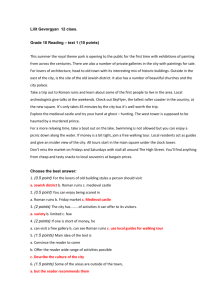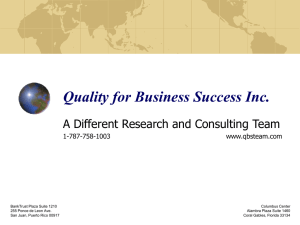PROBLEM MEMORANDUM – Gibson
advertisement
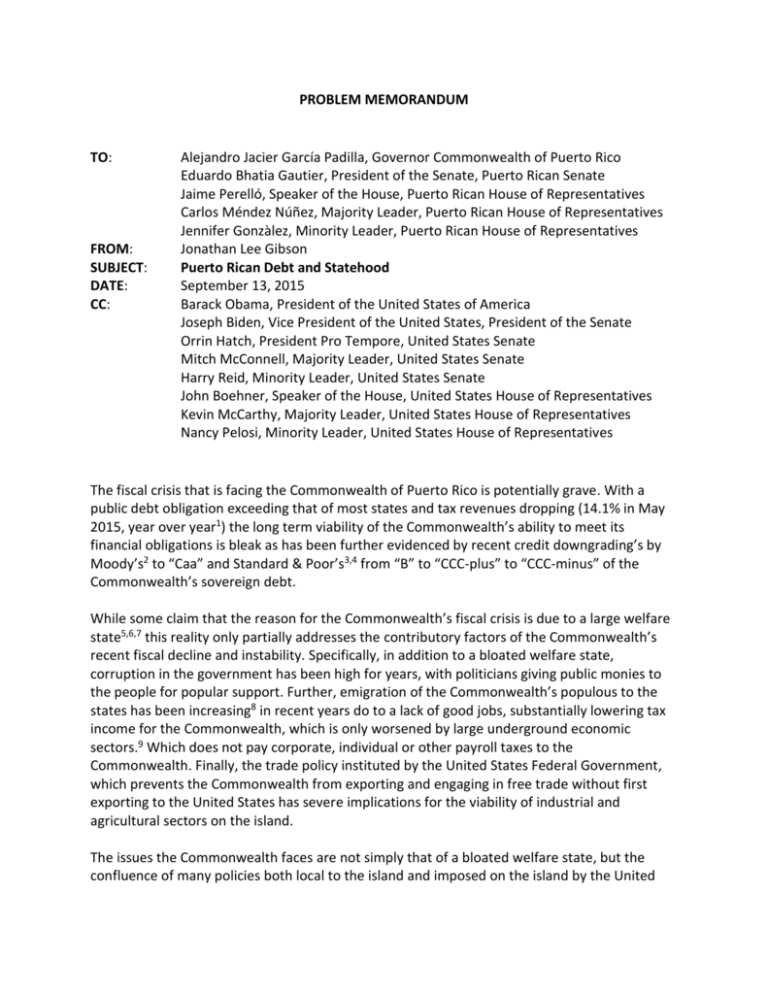
PROBLEM MEMORANDUM TO: FROM: SUBJECT: DATE: CC: Alejandro Jacier García Padilla, Governor Commonwealth of Puerto Rico Eduardo Bhatia Gautier, President of the Senate, Puerto Rican Senate Jaime Perelló, Speaker of the House, Puerto Rican House of Representatives Carlos Méndez Núñez, Majority Leader, Puerto Rican House of Representatives Jennifer Gonzàlez, Minority Leader, Puerto Rican House of Representatives Jonathan Lee Gibson Puerto Rican Debt and Statehood September 13, 2015 Barack Obama, President of the United States of America Joseph Biden, Vice President of the United States, President of the Senate Orrin Hatch, President Pro Tempore, United States Senate Mitch McConnell, Majority Leader, United States Senate Harry Reid, Minority Leader, United States Senate John Boehner, Speaker of the House, United States House of Representatives Kevin McCarthy, Majority Leader, United States House of Representatives Nancy Pelosi, Minority Leader, United States House of Representatives The fiscal crisis that is facing the Commonwealth of Puerto Rico is potentially grave. With a public debt obligation exceeding that of most states and tax revenues dropping (14.1% in May 2015, year over year1) the long term viability of the Commonwealth’s ability to meet its financial obligations is bleak as has been further evidenced by recent credit downgrading’s by Moody’s2 to “Caa” and Standard & Poor’s3,4 from “B” to “CCC-plus” to “CCC-minus” of the Commonwealth’s sovereign debt. While some claim that the reason for the Commonwealth’s fiscal crisis is due to a large welfare state5,6,7 this reality only partially addresses the contributory factors of the Commonwealth’s recent fiscal decline and instability. Specifically, in addition to a bloated welfare state, corruption in the government has been high for years, with politicians giving public monies to the people for popular support. Further, emigration of the Commonwealth’s populous to the states has been increasing8 in recent years do to a lack of good jobs, substantially lowering tax income for the Commonwealth, which is only worsened by large underground economic sectors.9 Which does not pay corporate, individual or other payroll taxes to the Commonwealth. Finally, the trade policy instituted by the United States Federal Government, which prevents the Commonwealth from exporting and engaging in free trade without first exporting to the United States has severe implications for the viability of industrial and agricultural sectors on the island. The issues the Commonwealth faces are not simply that of a bloated welfare state, but the confluence of many policies both local to the island and imposed on the island by the United States Federal Government. While it may be a temporary salve to the economic pains the island is facing it is not likely that simply having access to Chapter 9 municipal bankruptcy will ameliorate the current fiscal crisis. The problem is not just the totality of the debt load the Commonwealth is facing but also structural inefficiencies caused by the Commonwealth and Federal Government’s policies over the past few decades. A review of each of these issues will help to frame the interconnectedness of the various problems contributing to the Commonwealth’s economic problems and hopefully elucidate a variety of policy changes that may help to attenuate these troubles. Commonwealth Status and the Statehood Question Puerto Rico became a territory of the United States at the end of the Spanish-American War when Spain ceded Puerto Rico (and other colonies) to the United States. The Commonwealth’s relationship with the Federal Government has been wrought with difficulties ever since. For years and as a result of the so-called “insular cases” of 1901, the people of Puerto Rico were denied United States citizenship. However, due to a need for military conscripts during the First World War Congress passed the Jones Act of 1917, which gave the people of Puerto Rico citizenship, but not equal rights of citizenship10. However, Puerto Rico was still not allowed to self-govern and instead had a resident governor appointed by the United States Congress. It was not until 1947 that the United States Congress allowed the island to begin to incorporate as a Commonwealth and to elect its own governor. Even still it was not until 1950 when the United States Congress allowed the Commonwealth to draft its own local constitution, which was approved in 1952 by constitutional convention. To this day, the Commonwealth status and its relationship with the United States prevent it from having autonomy. The Island is still under the direct purview of the United States Congress, can not enter into free trade independent of the United States Congress, still does not have voting representation in Congress, can not vote for the office of President of the United States and is subject to the will of the state. This status, as we will see in the coming sections, directly effects the economy of the Commonwealth and arguably has contributed to the current situation. Political Corruption The polity of the Commonwealth is divided among three general political movements: Independence, Status Quo (e.g. remaining a Commonwealth territory of the United States) and Statehood. The political parties that favor one of these outcomes for Puerto Rico have regularly ‘bought’ popular support in the form of government give backs to industries, union workers and other influential political participants. These political favors have taken (though not limited to), in the case of the Teachers Union, the form of a holiday bonus not just in December, but also a second one in the middle of summer11. This is just one example, there are many items in the Puerto Rican budget which are political favors to groups that supported the current government. It is political suicide to remove these favors and as these favors grew, so did the fiscal budget of the island. Instead of raising funds for the national budget, the Commonwealth took out bonds to pay its obligations when there were budget shortfalls. While some have claimed recently that political corruption and favors are the root of the Commonwealths problems, I believe that the problem is far more complex then just these items in the budget since simply removing these from the Puerto Rican budget would not balance the budget and there would still be a shortfall between receipts and expenditures. Underground Economy Puerto Rico suffers from large underground cash economies12. While the drug trade is one of these underground economies it is a problem both in the Commonwealth as well as in the states in general. Where Puerto Rico suffers is with small cash businesses which do not report income and pay taxes13. These types of businesses are all over the island in the form of farm stands, lechoneras, and other businesses. Enforcement of tax levies is scant, if present at all. The lost revenues from these businesses certainly adds to the revenue problems facing the island, but by itself is only a small portion of the problem and compounds upon the other structural inefficacies14. Trade Policy I an attempt by the Puerto Rican Government to increase tax revenues over the years the instituted a 6.6% export tax. All products that leave the island are subject to this special tariff15. While this tariff does not impact exports from the island to the Mainland United States it does effect exports to other nations. This, arguably, has impacted local agriculture exports and other exports. In fact, over the past few decades Puerto Rican exports have dropped along with economic output which had created a vicious cycle of decreased economic output leading to decreased exports, ad infinitum. Breaking this economic trade cycle could help ameliorate the fiscal problems facing the island. Emigration Due to the economic issues facing the island, most residents of the island can get better jobs and live better economic lives on the mainland of the United States. Since they are citizens they can freely seek work in any of the States. The loss of educated residents on the island, who can arguably do better in the Mainland United States, and have been leaving in droves for decades, has been a drain on the workforce and added to the economic problems facing the Commonwealth. This drain on the workforce has also added to the economic problems facing the Commonwealth.16 Going Forward How should we look at potential options for the Commonwealth? While some in the financial sector want the island to institute austerity measures, this will only deepen the economic problems. Unlike other countries, which have had major budget issues and faced austerity, Puerto Rican residents can fly anywhere in the United States and as the population declines on the island, so will future tax revenues creating a downward spiral. Arguably the financial sector has a vested interest in the islands natural resources, which have been protected from strip mining and other industrial activities. Austerity, prima facie, will only guarantee the eventual collapse of the Commonwealth and the exploitation of the islands natural resources. John Rawls suggests that, when thinking about the Justness of policy, we should maximize liberty while simultaneously arranging social goods and inequalities in such a way that the are to the greatest benefit to the least advantaged and that we should do this from “behind the veil of ignorance,” that is, without taking into account our own position in life, ignorant of our station and our own wealth17. It is hard to argue that the Commonwealth is severely disadvantaged by the status quo relationship with the United States and it is incumbent upon the Commonwealth and the United States to address the fiscal issues facing Puerto Rico while maximizing the liberty of the people of Puerto Rico and benefiting the least advantaged: the people of the Commonwealth of Puerto Rico. Endnotes/References 1 Reuters. (2015a). UPDATE 1-Puerto Rico tax revenue drops 14.1 percent in May -Treasury. Retrieved September 4, 2015, from http://www.reuters.com/article/2015/06/12/usapuertorico-tax-idUSL1N0YY0XK20150612 2 Moody’s. (2105). Moody’s downgrades Puerto Rico GOs and COFINA Sr Bonds to Caa3 from Caa2; outlook negative. Retrieved September 4, 2015, from https://www.moodys.com/research/Moodys-downgrades-Puerto-Rico-GOs-and-COFINA-SrBonds-to--PR_329297 3 Reuters. (2015b). S&P downgrades Puerto Rico debt to “CCC+” from “B.” Retrieved September 4, 2015, from http://www.reuters.com/article/2015/04/25/usa-puertorico-spidUSL1N0XM01I20150425 4 Reuters. (2015c). UPDATE 2-S&P cuts Puerto Rico rating, says default seems inevitable. Retrieved September 4, 2015, from http://www.reuters.com/article/2015/06/30/sppuertorico-idUSL3N0ZG1UQ20150630 5 Timiraos, N. (2015). Puerto Rico Has No Easy Path Out of Debt Crisis. Retrieved September 4, 2015, from http://www.wsj.com/articles/puerto-rico-has-no-easy-path-out-of-debt-crisis1435526355 6 Yglesias, M. (2015). The Puerto Rico crisis, explained. Retrieved September 4, 2015, from http://www.vox.com/2015/7/1/8872553/puerto-rico-crisis 7 White, G. B. (2015). Puerto Rico’s Economy Is in Trouble. The Atlantic. Retrieved from http://www.theatlantic.com/business/archive/2015/06/puerto-rico-debt-crisis/397241/ 8 D’Vera, C., & Patten, E. (2015). Puerto Rican Population Declines on Island, Grows on U.S. Mainland. Retrieved September 4, 2015, from http://www.pewhispanic.org/2014/08/11/puerto-rican-population-declines-on-island-growson-u-s-mainland/ 9 Marquez, C., & Ferre, J. (2010). Puerto Rico’s underground economy estimated at $20 billion a year. Caribbean Business. Retrieved from http://www.caribbeanbusinesspr.com/prnt_ed/news02.php?nw_id=4566&ct_id=0 10 http://www.loc.gov/rr/hispanic/1898/jonesact.html 11 Sanabria-Valentin, Edgardo L. (2015). Personal Communication. 12 Duany, J., & US Census Bureau. (n.d.). The Census Undercount, The Underground Economy and Undocumented Migration: The case of Dominicans in Santurce, Puerto Rico. Retrieved September 13, 2015, from https://www.census.gov/srd/papers/pdf/ev92-17.pdf 13 Lopez, L. (2014). Desperate for taxes, Puerto Rico tries to get grip on underground economy | Reuters. Retrieved September 13, 2015, from http://www.reuters.com/article/2014/04/09/ususa-puertorico-economy-insight-idUSBREA380BS20140409 14 Marquez, C., & Ferre, J. (2010). Puerto Rico’s underground economy estimated at $20 billion a year. Caribbean Business. Retrieved from http://www.caribbeanbusinesspr.com/prnt_ed/news02.php?nw_id=4566&ct_id=0 15United States Customs and Border Protection (2013). Regulations for shipping goods to a company in Puerto Rico for resale. Retrieved September 13, 2015, from https://help.cbp.gov/app/answers/detail/a_id/326/~/regulations-for-shipping-goods-to-acompany-in-puerto-rico-for-resale 16 Watch, E. (2010). Puerto Rico Trade, Exports and Imports | Economy Watch. Retrieved September 13, 2015, from http://www.economywatch.com/world_economy/puertorico/export-import.html 17 Rawls, J. (1999). A Theory of Justice (Revised Ed). Cambridge, MA: Belknap Press.
